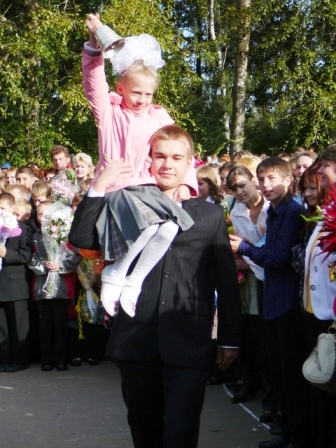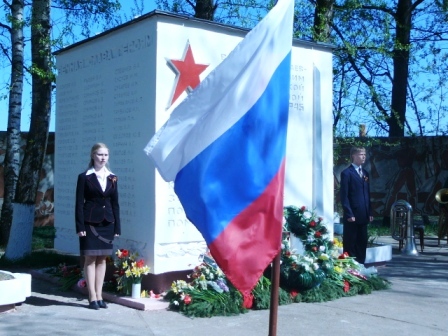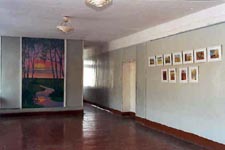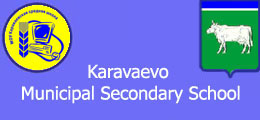

Russian version
Guest book
Mission Statement: Excellence in education, motivation for success,
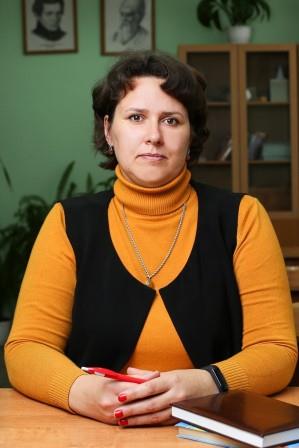
|
Our Slogan: The Future begins today!
Director Olga Aleksandrovna Frolova,
"You are welcome to Karavaevo Municipal Secondary School!"
Winner "Best Schools of Russia," October, 2006 -
One of ten schools of Russian Federation, which advanced to the victory in this nationwide competition held in Moscow.
Winner in Innovative Education Programs, May 2007 and June, 2006 -
Competitions were held in Moscow between Russian Federation regional municipal educational schools introducing the state supported "Innovative Educational Programs." Karavaevo Municipal Secondary School was on the published list of competitions winners. The school has received the presidential grant 1 million roubles twice.
Winner in Innovative Programs of school's libraries, June 2009 -
Competitions were held in Kostroma between regional municipal educational schools introducing the state supported "Innovative Programs." The library Karavaevo Municipal Secondary School was on the published list of competitions winners - 1-st place. The school has received the regional grant 50 thousands roubles.
Winner in Innovation Research, May, 2006 -
|
|
The Karavaevo school participated in the Russian educational forum, 2006, in Moscow, where it presented it is innovational project "Rural Network Remote School model." The school is a regional experimental area in research and approbation of complex automation to reorganize it into a remote educational center. Organizing pedagogical conditions are defined in the project to augment the network interactions of teachers, students and their parents, and the Regional Department of Education.
Russians have always shown a great concern for education. The right to education is stated in the constitution of the Russia Federation. It's ensured by compulsory secondary schools, vocational schools and higher education establishment. It is also ensured by the development of extramural and evening courses and the system of state scholarships and grants.
The goal of Russian education is to develop to the full talents of both children and adults and to bring up a modern creative developed person. It embraces two educational purposes: first it gives a general education to all children, and second, it selects the most able and gives them a more advanced education. It meets the requirements of up-to-date society. Now the great priority of the government should be education, and school should perform a key role in bringing up such a person. Our school isn't an exclusion and it takes an active part in this process.
|
|
Our school has no number due to the fact it's the only school in our suburb but it has a rather long name "Karavaevo Municipal Secondary School". It means: we are situated in a suburb of Kostroma called Karavaevo. We are a state comprehensive school taking children of all abilities and providing a wide range of education for all or most of the children in a district within 6.5 to 17 years age range. 630 pupils are trained in 2009-10 educational year in our Karavaevo school. There are approximately 18-25 students in each class. We are free. At first it seems that all state secondary schools must have the same educational program aimed at the same state standards. But it's not a secret that there is a struggle for every pupil between schools now and every school tries to find more opportunities for teaching its students, takes various measures in order to draw more children due to the fact that the birth-rate in Russia has dropped in recent years and many schools are at a very high risk of dropping out. Parents have the right to express a preference for the school they wish their child to attend. Parents have the right to basic performance information on schools.
Children either walk or take public transportation to get to school. The elementary, middle and high schools are located in 1 building, so all the children from the neighborhood go to the same place. School buses are only used by children who attend private schools. If parents want to send their children to a specialized school, they must arrange for the child's transportation to that school.
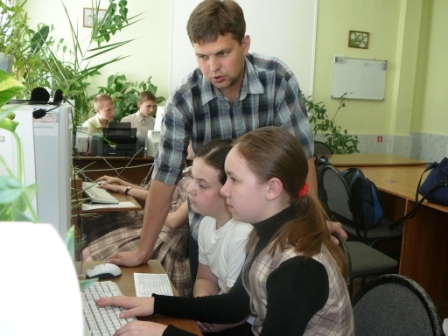
|
Classes are from 8:00 a.m. - 1:30 p.m., (or from 1:30 p.m - 6:00 p.m.) Monday through Saturday (6 days per week). There are 4 terms in a school year. Between the terms are vacations. The biggest vacation is for 3 months during the summer; the smaller vacation, in the fall is for 1 week. During the school day, children have a hot breakfast or snacks and dinners. It is very inexpensive to buy these things at school and children generally do not bring their own food from home. After classes children can stay at school, much like after-school programs in the U.S. until 6 p.m. During this time the children can play, do homework, or participate in other activities such as dancing, singing, painting, or sports. These after-school programs are for free.
The solution of the problem lies in developing a brand new model of teaching at school, emphasizing new directions and techniques in teaching. As far as our school is concerned, we offer and hope to capitalize on a new specialized course "Modern information technologies in the process of education."
In the first stage, which is called primary school, all children start learning education according to the same program. But as they grow a bit older, differences in ability and higher abilities become marked, so a teacher selects the able and offers them a specialized course of studying English profound. This course is introduced in the second grade and presupposes two lessons a week.
There are two computer science classes at our school. Initial exposure to computers and the Internet begin in the second grade. Basic knowledge and skills in Information Technologies are vital to our students' future success in this modern age of competition.
Our school is a 3-storey building. When you enter the school building, you get into the entrance hall, from it you get into the cloak-room, where the pupil and teachers leave their overcoats and hats. Besides on the ground floor you will find the gym hall with two changing-rooms: for boys and for girls. In the gym-hall we have Physical Education lessons and this is the place where sports competitions are held. We also have lessons of handicrafts on the ground floor. Boys and girls have handicrafts lessons separately: boys learn woodwork and girls learn cooking and needlework.
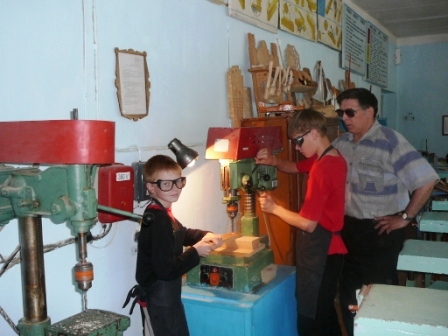
|
The ground floor is the floor of juniors: pupils of the first - the fourth grades. Their classrooms are all on the side of the corridor opposite the windows. The physics and chemistry classrooms are on the first floor. They are large rooms, supplied with all the necessary laboratory equipment, which makes it possible for the pupils to carry out much practical and experimental work.
Some of the junior pupils have nowhere to go after classes as their parents are at work. So they join the so called "Group of Supervised Studies". With the teacher, they first go to the school canteen and have dinner. Then the teacher takes them for a walk. When they come back, they start doing homework under the supervision of the teacher. When they have done their homework, they stay in school until their parents come back home from work. The first thing that attracts your attention in the corridor of the first floor is a lot of pictures on the wall. They make the corridor look like an art gallery.
Each school year begins on the 1-st of September with a holiday ceremony held in front of the school. It is arranged as a show for both parents and their children at which time all the characters meet together and play games. As well as pieces of drama, songs and rhymes, the script includes some games both parents in addition their children can play. The headmaster congratulates the children and parents on the First of September and emphasizes his hopes for a successful year for both students and teachers. He says that teachers are ready to share their hearts, knowledge, and experience with hundreds of school children. Also in the long run, to serve our country's best interests by bringing up a culturally tolerant and well educated generation; Russian citizens and respected members of the world family.

|
Our school was established in winter 1952. In addition now it is attended by 630 schoolchildren. The teaching staff is 63 people, all teachers have a high qualification grade.
School Curriculum defines 3 key stages: primary school 6.5-10 years old, then comes the secondary phase: 11-15 years old and further education that is sometimes called Advanced Supplementary Education: 15-17 years old. It is a two year course preparing for entry to higher education or professional training.
Compulsory education begins at 6-7 when pupils start their studying at primary school. They are instructed in acquiring basic skills in writing, reading, and counting. The aim of any primary school is to make pupils gain some general awareness of what they've come here for and what they will study at school. In other words to prepare them for further education. It's not easy for children to discover for themselves a new world, a world of knowledge. They still love listening to fairy tales and teachers have to use various teaching techniques to consolidate their ability to live in an imaginary fairy world and to remember new interesting facts. The course implies a graduate and guided improvement in basic skills under the conditions of specially organized games and classroom activities, taking into account the children's age and abilities. In primary school, a child's life is simple because they form a close relationship with one familiar teacher.
In first stage, which is called primary education, all children are educated on a developing basis, according to the same programs. As they grow older, differences in ability and attainment start to capitalize on a developing basis.
|
|
Our goal at Karavaevo is to encourage and motivate students for decisions about their future, and provide a strong foundation in their education. Basic general education lasts for 9 years. Graduates at this level may continue their education at senior high school or basic secondary general education. They may also enter an initial vocational school or non-university high level education. Initial vocational schools which offer one-and-a-half to two years' purely professional education and a Professional'ny Litsei which offer joint professional and secondary general education for three to four years and skilled workers' training at different levels. Non-university level higher education institutions also offer three- to four-year professional and secondary general education and two-year vocational training for holders of the School Leaving Certificate.
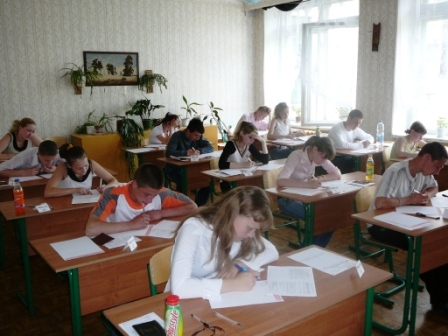
|
Our children go to school 6 days a week. Some of them go to special extra-schools and clubs in the evening. Some of them are "Internet-cafe", "Wood carving", Choir, Art Club, Motorcycle club, Folk and Modern Dances, School Theatre Studio.
They are busy most of the time. Students have 2-3 hours homework every night. On completing secondary school, pupils take their exams of the Certificate of Secondary Complete General Education (SCGE). Those who get good grades can stay on at school and go into 2 years further education. It prepares students for entrance to higher education and many forms of professional training. If a student does not do well on the SCGE exams, he or she can leave school and go to a job or a professional college of further education.
Children are expected to be ready if the teacher calls them to answer homework questions or problems at the blackboard. If a student is not ready he or she will receive a bad grade. The grading system is: 5-excellent, 4 - very good, 3 - satisfactory, 2 - negative mark - if a student is not prepared or if his answer was very bad. Student's grades are not treated as confidential. All classmates know exactly who received which grade; the reason is to encourage children to compete for better grades. Poor grades are an embarrassment.
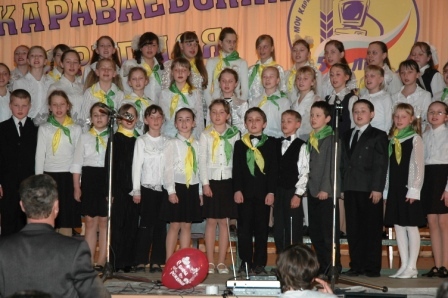
|
Secondary general education on the principle of basic general education continues for two years and ends when students are 16-17.5; The curriculum of the last two years offers a wide range of subjects, so that teenagers can choose a course of studies, according to their individual inclinations and abilities, and according to their future profession. Graduates from a secondary general school may apply for entrance to a higher education institution. Secondary education leads to the award of the Certificate of Secondary Complete General Education.
After finishing the 11th form of a secondary school, a lyceum or a gymnasium one can go into higher education. If a student is graduating a school with only "5"-s, and has had no lower grades in total marks for all 11 years, he or she will receive a "Gold medal". If the student has one or two "4"-s he or she will receive a "Silver medal". Earning a Gold medal is a big advantage for admission to a higher educational institution. All applicants must take competitive exams. Higher education institutions, that is institutes or universities, offer a 5-years program of academic subjects for undergraduates in a variety of fields, as well as a graduate course, he or she receives a candidates degree or a doctoral degree.
There are sport clubs at our school including basketball, volleyball, and football They are run by Physical Education teachers who strive for students' physical fitness. It is important for our students to be motivated towards maintaining a healthy body. That's why students are encouraged to take an active part in all sporting games and competitions.
In this age of high technology, people often pay more attention to earning a living rather than bringing up their children. For many children each day is a struggle to survive. Some of the students lack their parents' attention. We grown ups can easily underestimate the immense reserve of their souls.
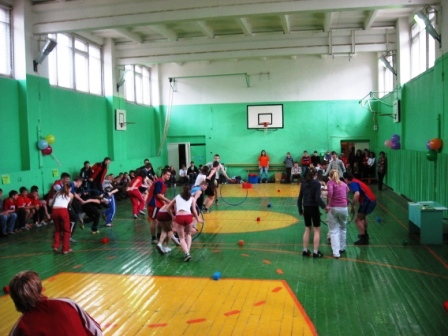
|
A wonderful psychologist works in our school. Her name is Natalia Leonidovna but all pupils call her an expert of human souls. She understands people very well, she can always find a solution for any problem.. When we have a conflict with our teachers or with our parents Natalia Leonidovna helps us to look into ourselves, find the course of the conflict and to remove it. During psychology lessons, we often take tests which have revealed a lot of information about ourselves and the people around us.
Sixty three teachers work at our school during the 2009-10 educational year. Teachers of our school are creative, caring and love children. Of our teaching staff, 80% have highest category. Also, twenty five teachers have received government awards.
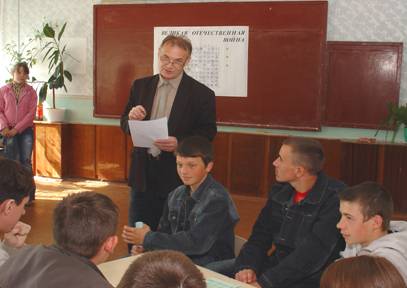
|
Training of teachers in Russia:
A very important part of Russia's education system is the training of teachers. There are three levels: primary/basic, secondary and higher level teachers.

|
In Russia, as in the World, children are anxious to grow up and do adult things. Boys and girls dream of having good jobs and good families. And everybody dreams of having a happy life.

|
Our school's mascot is the Talisman, the cheerful cow. Her name is "Poslushnitsa" which means very disciplined cow respecting and loving all. She brings pleasure to both children and parents alike.
Our Poslushnitsa loves computers and sports, in addition to giving tasty, fragrant, useful milk. Let our Talisman bring you success in your life too!
Administration, teachers and pupils of Karavaevo Municipal Secondary school thank Mark Aaron Coppedge, the citizen of the United States America for the help in creation of the English version of our site.
